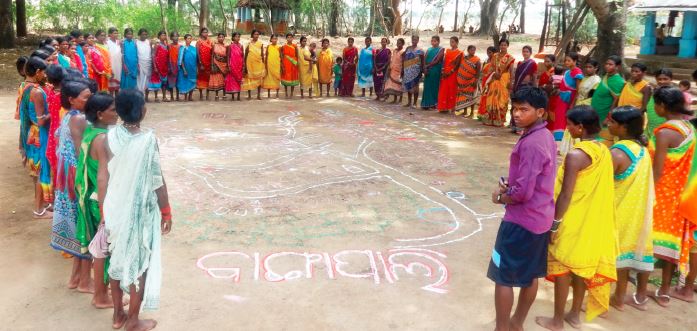 Primarily a financial advising firm, Innovative Financial Advisors Pvt. Ltd (Fiinovation), is a global consulting company, offering guidance and simplified solutions for Corporate Social Responsibility and Sustainability to help Corporations channelise their resources for elevating the community in which they operate on social, economic and ecological planes in accordance with their CSR Charter. Their aim is to help Corporations bridge the gap between businesses and communities through value-based CSR programmes in association with credible civil society organisations on pan India basis in the field of health, environment, education and livelihood. Dr. Soumitro Chakraborty, Founder, Director and CEO of Fiinovation, who is a social entrepreneur, strategise and implement several noteworthy CSR and Sustainability programmes across India in partnership with diverse corporations and NGOs. In an interview with CSR Mandate, he talks about his experiences in helping corporations achieve their CSR goals.
Primarily a financial advising firm, Innovative Financial Advisors Pvt. Ltd (Fiinovation), is a global consulting company, offering guidance and simplified solutions for Corporate Social Responsibility and Sustainability to help Corporations channelise their resources for elevating the community in which they operate on social, economic and ecological planes in accordance with their CSR Charter. Their aim is to help Corporations bridge the gap between businesses and communities through value-based CSR programmes in association with credible civil society organisations on pan India basis in the field of health, environment, education and livelihood. Dr. Soumitro Chakraborty, Founder, Director and CEO of Fiinovation, who is a social entrepreneur, strategise and implement several noteworthy CSR and Sustainability programmes across India in partnership with diverse corporations and NGOs. In an interview with CSR Mandate, he talks about his experiences in helping corporations achieve their CSR goals.
 Being a consulting firm for channelising and mobilising CSR, how do you involve corporate houses in your projects?
Being a consulting firm for channelising and mobilising CSR, how do you involve corporate houses in your projects?
CSR was incorporated as a mandate very recently under the new Companies Act, hence, there still exist a hesitance and ambiguity in defining CSR policies and integrating it into core operations. This is where Fiinovation comes into the picture.
With our expertise in research and implementation of social programmes, we aid Corporates in identifying and managing the entire CSR mandate. CSR policy design is the first step intended to formulate focused policy and guidelines, a key element to design a well-planned CSR intervention. As per the mandate, corporations under the ambit are supposed to have a predefined policy to provide transparency.
With an understanding on each and every requirement as per the Charter under Companies ACT Schedule VII, Fiinovation shares its experience and enables organisations to formulate the policy in accordance to their business goals; further to which, an adequate research is conducted to identify a need-based social intervention and after the initiative design, a requisite programme is established and implemented. Our Proposal Research Laboratory which is complemented by a robust Monitoring & Evaluation Division, enables us to make a remarkable difference on how projects are implemented.
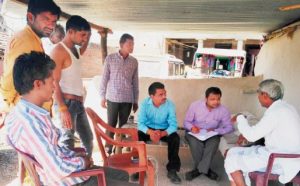 Our team with its expertise at groundacross India helps in identifying real needs and develop programmes and manages them. In addition, we are developing an indicator matrix that recommends sustainability mapping, which is followed by a well-drafted Impact Assessment Report.
Our team with its expertise at groundacross India helps in identifying real needs and develop programmes and manages them. In addition, we are developing an indicator matrix that recommends sustainability mapping, which is followed by a well-drafted Impact Assessment Report.
At Fiinovation, we consider money spent under CSR as an investment and not expenditure. This gives a new perspective to the CSR initiatives that are being undertaken. Our projects are based on participatory and integrated approach wherein we take care of every stakeholder with reference to the project. We do understand every programmer needs to have an exit plan for the funding organisation thus allowing us to define exit strategies and work on project sustainability.
Is there more than one Corporatehouse in a project? How do you decide upon the involvement of Corporate houses in a project?
It is a relative question that completely depends upon the scope of the project, required investment and expertise. When you talk about small and medium enterprises, there are more than one Corporate houses that gets involved even with reference to investment, expertise and involvement in the project. The involvement primarily is decided on the social return that is expected out of the project.
“With our expertise in research and implementation of social programmes, we aid Corporates in identifying and managing the entire CSR mandate. CSR policy design is the first step intended to formulate focused policy and guidelines, a key element to design a well-planned”
What is the methodology you use to research and identify the area of a CSR activity for a particular business house?
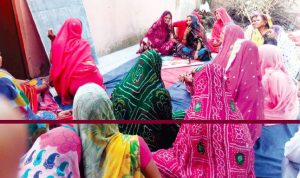 We conduct all researches in three stages (i) literature review and secondary research (ii) primary research that involves collection of data from identified demography/geography (iii) analysis and reporting. The research methodology is also focused on incorporating technology throughout the process to minimise or eliminate usage of paper while collecting data from the field that in turn helps us in automatising the data collection process, reducing data discrepancies and saving time and money.
We conduct all researches in three stages (i) literature review and secondary research (ii) primary research that involves collection of data from identified demography/geography (iii) analysis and reporting. The research methodology is also focused on incorporating technology throughout the process to minimise or eliminate usage of paper while collecting data from the field that in turn helps us in automatising the data collection process, reducing data discrepancies and saving time and money.
“Indian psychology works majorly on short term gains and lacks farsightedness, but ideally the country needs to focus at achieving a sustainable development. With change in various socio-political scenario, new amendments constantly come to the fore. Most of these amendments have vested interests, either of the State or the Centre, which in turn gives anew direction to Corporates. Sadly, Corporates, in order to cope with these modifications, have to change their strategy time and again, leaving CSR initiatives and programmes less impactful”
How do you go about your business of consultancy in CSR Policy Design and Partnership Management?
Our approach towards consulting services in CSR Policy Design and Partnership Management demands understanding of every stakeholder’s requirement and thereafter, finalising policy draft or defining partnerships so that every aspect is addressed. We identify and select credible implementing partners with relevant experience to the programme, and hold a command on community mobilisation while also mitigating risks when required. It involves a rigorous assessment of CSOs based on their past work, hold multiple meetings at different levels with Corporate houses; primary and secondary studies to understand the demography of the operational area, and referring to different government policies and schemes to present a holistic picture.
Are you also involved in garnering funds for the projects and NGO partners?
We do mobilise resources and help NGO partners empanelled with us in getting resources for project implementation. This mandate falls under CSR-CSO partnership service.
Since you are based in Delhi, do you also work with clients outside NCR region?
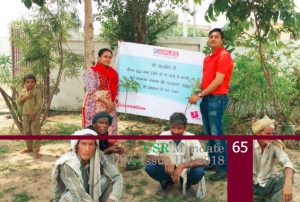 Absolutely! Our footprint is pan India. We have successfully implemented various projects. One such project is with Uflex Limited where they are working for natural resource conservation and optimisation initiatives in Bhind District of Madhya Pradesh and Gautam Buddha Nagar in Uttar Pradesh.
Absolutely! Our footprint is pan India. We have successfully implemented various projects. One such project is with Uflex Limited where they are working for natural resource conservation and optimisation initiatives in Bhind District of Madhya Pradesh and Gautam Buddha Nagar in Uttar Pradesh.
In partnership with our organisation, they successfully rolled out rain water harvesting and plantation interventions through the implementation agency-AROH Foundation. Currently, along with UP, we are also working in Malanpur in Bhind District of Madhya Pradesh.
Notably, Uflex manufactures PET Chips (raw material for polyester film) at its plant in Malanpur with a production capacity of 72,000 tonnes per annum. The initiative aims to build the capacity of the community to conserve and optimise the natural resource base. The project was recently acknowledged by ABP News CSR Leadership Award Jury as the Best Environment-Friendly Project. We also had JK Tyre Industries partnering with us for conducting impact assessment on Adult Literacy Project in Kankroli(Rajasthan), Morena (Uttar Pradesh and Mysore (Karnataka).
Do share with us about the impact that these projects have created in the different regions.
Currently, we are working on multiple environment-based projects. One of them being an environment and livelihood project with PI Industries Ltd. PI Foundation, a Trust supported by PI Industries Ltd, is working withus to implement their CSR initiative on Income Generation Programme Through Sustainable Agriculture among the farmers in Odisha.
This project aims to skill over 1000 farmers by giving hands-on training on the working of seed drillers, sowing method, insect-pest management, judicious use of farm inputs and other extended services over the next two years, thereby enabling agriculture on sustainable lines of production in the Rayagada district of Odisha. The focus is also on product leadership.
The project operates in seven districts of Odisha ensuring livelihood security and improvement in the quality of life of the farmers. The investments in sustainable agricultural interventions can surely impact the livelihood of our farmers and also help educate them to practice sustainable methods which are favourable to the ecological support system.
Most CSR projects are announced with a lot of enthusiasm, but very few are making that kind of impact on a long term basis. What are your thoughts on this?
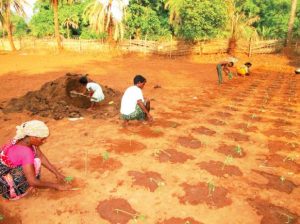 Indian psychology works majorly on short-term gains and lacks farsightedness, but ideally, the country needs to focus on achieving a sustainable development. With change in the socio-political scenario, new amendments constantly come to the fore. Most of these amendments have vested interests, either of the State or the Centre, which in turn gives a new direction to Corporates. Sadly, Corporates, in order to cope with these modifications have to change their strategy time and again, leaving CSR initiatives and programmes less impactful.
Indian psychology works majorly on short-term gains and lacks farsightedness, but ideally, the country needs to focus on achieving a sustainable development. With change in the socio-political scenario, new amendments constantly come to the fore. Most of these amendments have vested interests, either of the State or the Centre, which in turn gives a new direction to Corporates. Sadly, Corporates, in order to cope with these modifications have to change their strategy time and again, leaving CSR initiatives and programmes less impactful.
Many projects are taken up in isolation without connecting to other aspects. How do you address these issues and help corporations connect different aspects for an all-round impact?
Talking about CSR initiatives, every organisation has certain areas of interest in alignment with the ethos of the company. Hence, the welfare programmes are specific too. CSR in India has travelled through different phases, such as community engagement, socially-responsible employee relations and philanthropic endeavours, efforts that were not previously documented. However, CSR is transforming from an auxiliary concept to a strategic practice. Yet, it is relatively at its nascent stage in India.
Our efforts are directed towards giving that initial push to each company for a focused investment in a CSR activity that is monitored, evaluated and assessed, ensuring an impact at some levels, even if at a small scale.
It would be unjust to expect Corporates to work across all components of social issues. I would say, if a Corporate sets up a healthcare centre to monitor primary health, it still is a good move to work on a micro component. The ideal situation would be pooling in with another Corporate to work on another component. From our experience, we do realise it is not an easy job on the ground.
In order to conduct a successful project, we study the various aspects, components and challenges that influence the course of the programme; further to which, the programme is designed keeping in mind various grassroot challenges. The aim is to address multiple issues across the chain.
Some of our recent collaborations include Uflex Pvt. Ltd, Flex Foods, PI Industries, Laurus Labs, IL&FS –Skills, JK Tyre, Mytrah Energy, RPG Foundation and KEC International Limited, amongst others. Surging ahead in its endeavour towards creating sustainable ecosystem, India’s largest multinational flexible packaging materials and solution company, Uflex Limited, has extended its existing partnership with Fiinovation for natural resource conservation and optimisation initiatives.
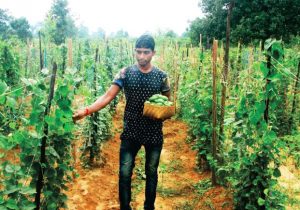 The project extends to a period of three years to be implemented in two villages in Gautam Buddh Nagar, Uttar Pradesh. The project aims to train 100 farmers each in both villages on ex-situ and in-situ measures of rainwater harvesting. This helps in meeting the irrigation demands as well as help increase the level of groundwater. The project also aims at distributing 100 saplings to the villagers in the target area. Each villager who is given a sapling will be asked to take responsibility of the same. This will eventually lead to an income generation model.
The project extends to a period of three years to be implemented in two villages in Gautam Buddh Nagar, Uttar Pradesh. The project aims to train 100 farmers each in both villages on ex-situ and in-situ measures of rainwater harvesting. This helps in meeting the irrigation demands as well as help increase the level of groundwater. The project also aims at distributing 100 saplings to the villagers in the target area. Each villager who is given a sapling will be asked to take responsibility of the same. This will eventually lead to an income generation model.
PI Industries, a leading agri input, custom synthesis and manufacturing company, in collaboration with Fiinovation, is implementing their CSR initiative of Income Generation Programme through sustainable agriculture among the farmers, which is also improving the quality of air for a healthy future of the farmers.
We also have a team that works on ground and conduct baseline studies for various organisations and clients so we can provide unparalleled research, facts and figures.
For our efforts in the CSR arena, we were recently accorded the Best Technical CSR Provider Award, at Vigyan Bhawan, New Delhi.

